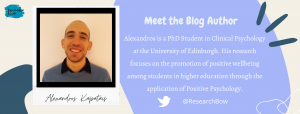First things first – having a child has been one of the biggest blessings of my life, if not the biggest. And equally, having enrolled in a PhD in Clinical Psychology, here at the University of Edinburgh, is also a big milestone for me. As I came to realise, each blessing is accompanied by its own challenges – which hopefully help me grow and evolve over time. While my journey as a PhD student is in its early stages, I have been a father for about 3.5 years now, and in this short blog, I will try to convey some of the lessons I have learned as a PhD student and a father. Most of them have to do with time, and all of them have to do with self-management! That includes time management, energy management, and focus management. In fact, you may have heard parents talking about how much more efficient they became after their children were born. I am happy to say that this has been the case for me as well. So, let’s dive into the lessons!
Lesson 1: Everything is a sacrifice
From early on, I realised that everything is a sacrifice; that is, for every choice I make, I sacrifice the infinite other possibilities I have to let go. This makes it paramount that the choice I end up making, in any given moment, better be worth the sacrifice! For example, If I choose to rise early in the morning, I will have to sacrifice any extra sleep and the warm comfort of the bed. That sacrifice, however, can give me time to exercise, stretch, and start the day strong and (most days) have me feel energised for the day ahead. This, in turn, helps me be in a good mood when my son wakes up, and I feel healthy and energetic when it comes down to reading, writing, and thinking about my PhD during my working day. If I choose to sleep in, however, I sacrifice all those benefits. I get the extra sleep, which sometimes is needed, but a lot has to be sacrificed for that extra sleep. This reminds me every time – oftentimes painfully so – that everything is a sacrifice, and that every little thing matters.
Lesson 2: Every little thing matters
It’s easy to see the interconnection between all the little things in our lives. For example, if I choose to sleep late, it affects my sleep quality, and it affects how I will show up with my son, and for my studies the next day. If I choose to overeat, I will feel sluggish and lack energy and vitality, which makes it difficult to concentrate on my studies and to feel energetic enough to run around and dance with my son. Every small decision I make matters, and it affects the big areas of life because it affects pretty much everything – from my energy, focus and how much available time I have to devote to my son and to the PhD. Through the years, I came to realise that one of the best of these small decisions I make in my daily life is to exercise.
Lesson 3: Exercise is a need, not an obligation
Willpower, perseverance, patience. All these qualities are essential both as a parent and as a PhD researcher. If I don’t exercise these muscles, then my PhD and my relationship with my son will suffer. If I do, then I will feel more present and alert for my research, more playful with my son, and in a better mood. And I have found that exercise is a great tool that helps with both areas so much. In fact, if I had to quit all of my self-care routines except one, then exercising would be the one to keep. It makes such a big difference. Also, I often get really good ideas during my exercise! For example, part of this article was ‘written’ in my mind during an early morning run! However, in order to make sure I make time for my daily exercise I figured I needed to set up some daily habits around it.
Lesson 4: Habits are lifesavers
Habits, also known as routines, systems, rituals, lifesavers! Both as a parent and as a PhD student, there are some things that need to be done every day. For example, making breakfast for my son, making sure he is ready before going to the nursery, making dinner and so on. Having routines around these daily activities, not only helps my son know exactly what is happening and what to expect, but it also frees up a lot of cognitive energy as there is no need to make all kinds of decisions about what to do, at what time, and in which order every day. It’s dinner, bath, brushing teeth and sleep (hopefully!). The same goes for the PhD. Carving out some time in the morning just to do some writing at the same time approximately every day has been very helpful, without having to waste time or energy wondering when that should happen.
Lesson 5 and Conclusion: The lessons never end
I wish to conclude this piece with a fifth and final lesson. That is, the lessons never end. Each day, week, and month, my son grows, evolves, and changes. And this, in turn, invites me to learn, grow, and evolve with him. The strategies, games, and jokes that used to work a few months ago, have now become obsolete – inviting me to adapt, change and innovate. Similarly with the PhD. My ideas, knowledge, and thoughts around my PhD change on a daily, weekly, and monthly basis. It’s therefore up to me to keep up to speed with all these changes, embrace them, and ride the wave, by keep learning and adjusting along the way! I hope this blog post inspires you to do the same, and to keep learning and adjusting in an ever-changing environment that is the PhD journey; and especially so for ones that include parenthood!






This blog is fantastic, Alexandros!
Thanks for sharing your lessons. Some of them are truly universal.
Best wishes,
Dani
Thanks for your kind words Dani, I think that all of them are universal 😉
Alexandros